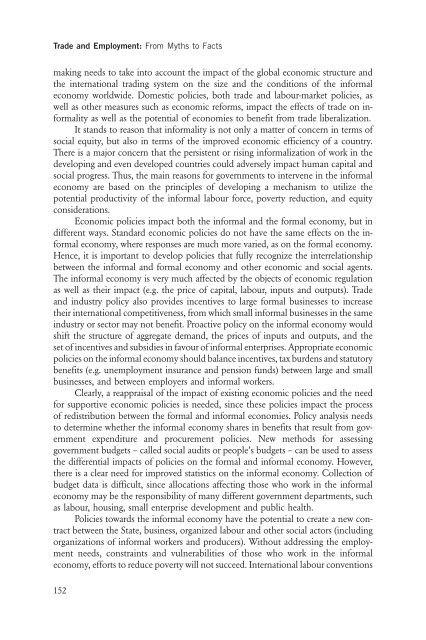Trade and Employment From Myths to Facts - International Labour ...
Trade and Employment From Myths to Facts - International Labour ...
Trade and Employment From Myths to Facts - International Labour ...
Create successful ePaper yourself
Turn your PDF publications into a flip-book with our unique Google optimized e-Paper software.
<strong>Trade</strong> <strong>and</strong> <strong>Employment</strong>: <strong>From</strong> <strong>Myths</strong> <strong>to</strong> <strong>Facts</strong><br />
making needs <strong>to</strong> take in<strong>to</strong> account the impact of the global economic structure <strong>and</strong><br />
the international trading system on the size <strong>and</strong> the conditions of the informal<br />
economy worldwide. Domestic policies, both trade <strong>and</strong> labour-market policies, as<br />
well as other measures such as economic reforms, impact the effects of trade on informality<br />
as well as the potential of economies <strong>to</strong> benefit from trade liberalization.<br />
It st<strong>and</strong>s <strong>to</strong> reason that informality is not only a matter of concern in terms of<br />
social equity, but also in terms of the improved economic efficiency of a country.<br />
There is a major concern that the persistent or rising informalization of work in the<br />
developing <strong>and</strong> even developed countries could adversely impact human capital <strong>and</strong><br />
social progress. Thus, the main reasons for governments <strong>to</strong> intervene in the informal<br />
economy are based on the principles of developing a mechanism <strong>to</strong> utilize the<br />
potential productivity of the informal labour force, poverty reduction, <strong>and</strong> equity<br />
considerations.<br />
Economic policies impact both the informal <strong>and</strong> the formal economy, but in<br />
different ways. St<strong>and</strong>ard economic policies do not have the same effects on the informal<br />
economy, where responses are much more varied, as on the formal economy.<br />
Hence, it is important <strong>to</strong> develop policies that fully recognize the interrelationship<br />
between the informal <strong>and</strong> formal economy <strong>and</strong> other economic <strong>and</strong> social agents.<br />
The informal economy is very much affected by the objects of economic regulation<br />
as well as their impact (e.g. the price of capital, labour, inputs <strong>and</strong> outputs). <strong>Trade</strong><br />
<strong>and</strong> industry policy also provides incentives <strong>to</strong> large formal businesses <strong>to</strong> increase<br />
their international competitiveness, from which small informal businesses in the same<br />
industry or sec<strong>to</strong>r may not benefit. Proactive policy on the informal economy would<br />
shift the structure of aggregate dem<strong>and</strong>, the prices of inputs <strong>and</strong> outputs, <strong>and</strong> the<br />
set of incentives <strong>and</strong> subsidies in favour of informal enterprises. Appropriate economic<br />
policies on the informal economy should balance incentives, tax burdens <strong>and</strong> statu<strong>to</strong>ry<br />
benefits (e.g. unemployment insurance <strong>and</strong> pension funds) between large <strong>and</strong> small<br />
businesses, <strong>and</strong> between employers <strong>and</strong> informal workers.<br />
Clearly, a reappraisal of the impact of existing economic policies <strong>and</strong> the need<br />
for supportive economic policies is needed, since these policies impact the process<br />
of redistribution between the formal <strong>and</strong> informal economies. Policy analysis needs<br />
<strong>to</strong> determine whether the informal economy shares in benefits that result from government<br />
expenditure <strong>and</strong> procurement policies. New methods for assessing<br />
government budgets – called social audits or people’s budgets – can be used <strong>to</strong> assess<br />
the differential impacts of policies on the formal <strong>and</strong> informal economy. However,<br />
there is a clear need for improved statistics on the informal economy. Collection of<br />
budget data is difficult, since allocations affecting those who work in the informal<br />
economy may be the responsibility of many different government departments, such<br />
as labour, housing, small enterprise development <strong>and</strong> public health.<br />
Policies <strong>to</strong>wards the informal economy have the potential <strong>to</strong> create a new contract<br />
between the State, business, organized labour <strong>and</strong> other social ac<strong>to</strong>rs (including<br />
organizations of informal workers <strong>and</strong> producers). Without addressing the employment<br />
needs, constraints <strong>and</strong> vulnerabilities of those who work in the informal<br />
economy, efforts <strong>to</strong> reduce poverty will not succeed. <strong>International</strong> labour conventions<br />
152

















